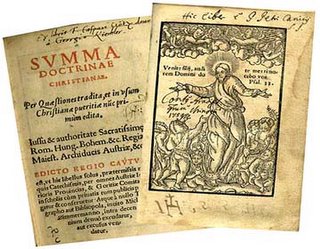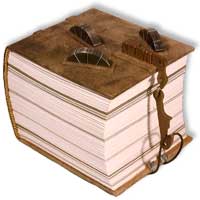 The Principal and First Educators of Their ChildrenA great number of catechists expressed concern that they were expected to be the primary influence on the religious formation of the children in the parish when, in fact, this is the responsibility of the parents or guardians. The importance of this obligation cannot be overstated. Canon law addresses this concern as follows: "Parents above others are obliged to form their children in the faith and practice of the Christian life by word and example; godparents and those who take the place of parents are bound by an equivalent obligation" (Code of Canon Law, Canon 774.2). If little or no foundation has been laid in the home, it is very difficult for catechists to overcome this deficiency during the relatively brief classes at the parish.
The Principal and First Educators of Their ChildrenA great number of catechists expressed concern that they were expected to be the primary influence on the religious formation of the children in the parish when, in fact, this is the responsibility of the parents or guardians. The importance of this obligation cannot be overstated. Canon law addresses this concern as follows: "Parents above others are obliged to form their children in the faith and practice of the Christian life by word and example; godparents and those who take the place of parents are bound by an equivalent obligation" (Code of Canon Law, Canon 774.2). If little or no foundation has been laid in the home, it is very difficult for catechists to overcome this deficiency during the relatively brief classes at the parish.--Second Synod of the Diocese of Austin, "Religious Education," 8-7
-----------------------------------------------------------------------
The unofficial subtitle for this blog is "A blog about homeschooling, Catholicism, and Catholic homeschooling." (It will become the official subtitle if I ever figure out the necessary html.) But one subject I've tried to stay away from, despite its obvious relevance to the content of this blog, is the policy regarding Catholic education in my own diocese. This for several reasons, not the least of them being that there would necessarily be some unpleasant griping about the way our diocese, despite having an encouragingly pro-education, and explicitly pro-home education, bishop, treats homeschoolers.
But I 'm done with being silent. So first let me talk about our wonderful bishop, who hit the ground running with the country's most farseeing, thorough, and practical programs for preventing abuse of children by clerics and church employees (this before the 2002 scandals hit the newspapers, and the local media started to be interested in what kinds of programs the diocese might have); who moved quickly to establish a diocesan high school on the "wrong" side of the freeway (the side where most Catholics actually live), where dropout rates are the shame of the city, with the intent of getting kids through high school and into good colleges; who began personally presiding at the annual homeschool blessing mass, and for the first time opened a dialogue between the diocese and homeschooling Catholics. The list could go on just on educational matters alone; and heaven knows what other good he has been doing, out of the public eye.
Now, in the last ten years, there has been something of a slow revolution in homeschooling. New homeschoolers no longer worry that their local public school district will sic the truant officers on them, or that the state will attempt to decide what books, curriculum, or pedagogy families will use. Homeschoolers have gone from being below the radar, to dangerous fringe kooks who everybody knows need stringent regulation if not outright outlawing, to just normal people exercising an increasingly popular educational option. Sure, there are places a little behind the curve, and, eternal vigilance being the price of liberty, we would be fools to become complacent and stop hounddogging our legislators, but there has been a sure and certain shift in the zeitgeist.
So it has been a rude shock to homeschoolers in this diocese, and in dioceses around the country, to discover that as far as their diocesan officials are concerned, it's the 1980's, and homeschoolers have emerged from below the radar only to find themselves the objects of hamfisted attempts to impose intolerable regulations, just as public school bureaucrats, afraid of a situation suddenly growing out of their control, once attempted to control and prosecute homeschooling families. The most obnoxious of these regulations stems from a development that devout Catholic parents at first hailed: the USCCB's welcome discovery of the
empty-headed heterodoxy of most catechetical materials being used in parishes across the country. The bishops eventually compiled a
list of acceptable catechetical materials submitted by publishers hoping not to lose Catholic school dollars. And suddenly, as diocesan bureaucrats have become increasingly eager to regulate homeschooling Catholic families, dioceses from St. Augustine to Los Angeles have decided that this list constitutes the
only materials that parents may use to educate their children in the faith.
But nothing in the USCCB's
protocols for determining orthodoxy of materials implies the listing to be exclusive; and by its nature the review process must necessarily exclude both out-of-print materials and catechesis not given in text form, such as explanations of doctrine from parents, pastors, and catechists. Nor does the list have anything to say about the quality of the texts in dimensions other than doctrinal orthodoxy. These are important considerations for homeschoolers, as the very nature of homeschooling makes the USCCB conformity listing almost completely irrelevant.
First, many families choose to use good and orthodox materials that are no longer in print: for example, Bishop Morrow's classic
My Catholic Faith, the doctrinal contents of which are as true today as they were in 1941 when it was first published. Where there have been changes to non-doctrinal teaching, such as regulations regarding marital impediments or cremation, any reasonably educated Catholic familiar with her Catechism is able to give corrections. Recently reprinted due to the demand of Catholic parents for beautiful, orthodox, comprehensive, and affordable catechetical materials, as far as I know it has never been sent to the USCCB for approval--no proof of unorthodoxy, but a demonstration of the limited nature of the bishops' undertaking, as they don't pretend to review all Catholic educational materials that exist--only those currently printed by mainstream publishers for classroom use.
Second, as the ranks of Catholic homeschoolers grow, they more and more include unschoolers, who eschew textbooks in favor of real-life experiential teaching. Their children won't read the latest glossy Harcourt Brace Jovanovich offering to learn the teaching of the Church or the obligations to participate in social justice and live lives of heroic virtue: they learn these things from their families, from their pastors, from their volunteer work inside and outside the parish, from reading Scripture itself. Look at the pages of the textbooks used in parish CCD classes, they would say; see the photographs of people in "real life" situations with captions saying "How would you live Jesus' teachings in these situations?" Catholic unschoolers, and indeed all Catholic homeschoolers, don't need these things because they are living these situations, in the company of their parents who offer moral advice and instruction, not sitting at a desk, imagining. The bishops' list is of classroom materials. Homeschoolers, by definition, are not learning in a classroom. This raw fact alone should make obvious the unreasonableness of forcing homeschooling parents to use the "approved" materials only.
Finally, Catholic homeschoolers find the fluff-headed, dumbed-down Catholicism presented in parish catechetical materials to be as dangerous to their children's faith as any Christological or ecclesiological errors. While the excellent Ignatius Press curriculums, Image of God and Faith and Life, made the "approved" list, these cover only grades K-8 (and given the accelerated pace most homeschool children learn at, really only about through grade 5), with nothing for the high school years. Other than Ignatius, the undemanding content of the approved texts is frankly an embarrassment to the Catholic intellectual tradition. In the word of my non-Catholic husband, upon flipping through our second-grader's CCD text with its bubblegum contents, "It's hard to believe you guys produced Thomas Aquinas."
When the American bishops reviewed, judged, condemned, and at last approved the textbooks their diocese were spending millions on, was it ever their intent to imply that these books were the source and summit of Catholic catechesis, and that all parents be forced to use them, and them alone? If so, they gave no intimation that that was their intent.
In the main, American Catholic homeschoolers, as homeschoolers in general once were, are at the mercy of geographic fortune. You're in luck if you happen to be teaching your children their faith in
Peoria, for instance, where the written policies for homeschoolers are benign and undemanding or in
Pittsburgh, where the policy is lengthy, enthusiastic, and recognizes the obvious fact that "The Church is made one in the sacrament, not in the educational technique or textbook."
Less lucky are you to find yourself in
Phoenix or, much worse,
Florida, where the bishops have decided that those errant homeschooling families must be forced into CCD and made to use the texts their parents are homeschooling to avoid, or in the
Los Angeles or San Bernardino dioceses, where homeschoolers are not only forced to use only materials from the bishops' list, but where Ignatius Press' high-quality, orthodox
Faith and Life curriculum, though specifically approved by the U.S. bishops (and one of the two curriculums, the other also published by Ignatius, homeschoolers find to be usable), has been unilaterally removed from the list of acceptable materials by the diocesan educational politburo.
The $64,000 question, of course, is "Can they enforce it?" How many legions does the bishop, or more likely the diocesan Director of Catechesis, have? The main tool of enforcement, of course, is to hold the sacraments hostage, and forbid homeschooled children whose parents haven't toed the line from receiving their First Communion or Confirmation. Canon law would seem to be on the side of the parents, especially Canon 793:
"Parents, and those who take their place, have both the obligation and the right to educate their children. Catholic parents have also the duty and the right to choose those means and institutes which, in their local circumstances, can best promote the Catholic education of their children."
But Rome is a long way away, and meanwhile your pastor or DRE has told you that little John Paul won't be eligible for First Communion unless and until you agree to use the parish's materials. You know that you are responsible for ensuring he receives the sacraments. What do you do?
Realistically, in parishes where homeschooling parents have figured out there is a threat of their children being punished for the family's educational choices, the recourse is simply to lie. You are aware of your sacred obligation to raise your children in the faith and ensure they are provided the sacraments; you know that you are, according to the constant teaching of the Church, the primary and principal educator of your children; you know that you cannot, in conscience, follow the insane directive to choose from a list of unsuitable materials; and when your DRE asks if you're using the same textbook as the CCD children, you find yourself saying "yes," and ask God for forgiveness.
This is the actual situation of an ever-increasing number of Catholic homeschooling parents. Is this what our bishops really want? Is fear and distrust of pastors, evasion of discussions that might lead to questioning, and parents' resulting withdrawal from parish life for fear of being forced to choose between betraying our duties to our children or bearing false witness--is this what our bishop, who has done so much to open the door to dialog with homeschooling Catholics, intended?




